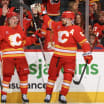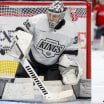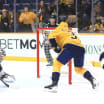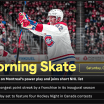The Coaches Room is a regular feature throughout the 2022-23 regular season by former NHL coaches and assistants who will turn their critical gaze to the game and explain it through the lens of a teacher. Phil Housley and Mark Recchi will take turns providing insight.
In this edition, Recchi, a three-time Stanley Cup champion and Hockey Hall of Fame player who's been an assistant with the Pittsburgh Penguins and New Jersey Devils, writes about the keys to staying sharp and being ready for the Stanley Cup Playoffs.
Coaches deal with fine line between rest, staying sharp for playoffs
Recchi says experience must be used as weapon, which helped Bruins win Stanley Cup in 2011

By
Mark Recchi
Special to NHL.com
In 2008-09, I was with the Boston Bruins. We were in the Stanley Cup Playoffs and swept the Montreal Canadiens in the Eastern Conference Quarterfinals. Things were looking good for us. We were feeling good. Why wouldn't we feel good? We just swept in the first round of the playoffs.
But the time off hurt us. Guys went golfing. They took their minds off hockey. We let our guard down. We finished the series against the Canadiens on April 22 and didn't play again until May 1, Game 1 of the semifinals against the Carolina Hurricanes. We won Game 1, but that high went away quickly.
The Hurricanes defeated us in Games 2, 3 and 4 to take a 3-1 lead in the series. We climbed back, but we lost in seven.
Could we have won the series? Yes, absolutely. Should we have won it? That's a different story because I vividly remember us not having that same edge, that same intensity that we had against the Canadiens.
Again, we let our guard down and it bit us in the you know what.
That was in the playoffs, but it can happen in the regular season too, and that's what teams that have already clinched a playoff berth are fighting right now: Human nature, the feeling that you've accomplished something great, and you can take a deep breath.
Sure, you can take that breath, but don't let it last too long. The longer that breath goes, the less likely you are to ramp it back up in time for April 17, when the postseason begins.
Coaches from the teams that are in, or the teams that know they're going to be in in a matter of time like the Colorado Avalanche, are likely in the process now of having conversations with their general managers, coaching staffs and leadership groups about the right way to go about handling the final five or six games they have to play.
Phil Housley wrote about rest being a weapon in
the last Coaches Room
on March 21, and he's 100 percent right. But too much rest, in my opinion, can be a detriment to what you eventually need to do come April 17 or 18, whenever you open your first-round series.
The key is to keep building your game to be playing really good hockey going into the playoffs. Yes, there's a fine line between building and staying sharp, and resting so you have the energy and health you need in two weeks, but that's where coaching and leadership has to come in.
To put it bluntly, it's hard to crank it up when you've been in neutral. You just can't turn it on suddenly for Game 1. The intensity is so high once you get into a playoff game and if you haven't been playing at that level, to go there and expect you to do it the first game or couple of games, it's just crazy to ask of the players.
The intensity jumps up tenfold. It's unbelievable. The passion, the fire, the competitiveness, it's just crazy. That's why some of those teams that have been trying to make the playoffs for the last month or two are in that mode, that do-or-die situation, per se, may be at an advantage. Of course, it could be a disadvantage because they might have expended so much physical and mental energy just to get there that they won't have enough when they actually arrive, but that's their own fight to fight.
As a team that's not in that fight, you have to make sure you stay sharp, or you very well could get caught by one of those teams that have been playing that hard and intense hockey for a while just to make it into the playoffs. You have to ramp up to that level when you hit the playoffs and it's an even higher level so it's an even higher ramp to climb, which is hard to do when you've just been playing hockey when you know you're in it.
It's not easy as a coach to manage it, but it can be done. Look at the Bruins, they sat out Patrice Bergeron, Brad Marchand and Hampus Lindholm a few games ago. They were all nicked up a little, but coach Jim Montgomery did it earlier, which I like. Sit those guys out a little bit earlier and then they still have enough time to ramp it back up for the playoffs knowing they have to be ready and sharp.
There are conversations with players on how they're feeling, what their bodies are telling them. There's probably a lot of that going on right now because there are guys banged up now with big aches and pains that they're playing through and if you're in a position to give them a night off, a practice off, that will be beneficial. But most of the time we'll see that used as a maintenance day in practice, not a game.
To me, that's NHL load management and I don't think that will ever change. I know it's different in the NBA, where load management is very much a part of the league, but in the NHL, I don't see it being a major thing because guys know they have to play to feel sharp. Practice time is limited, and morning skates are useless unless they need to work on a skill.
It's assumed that a lot of guys will sit the last game if their team is in, in a set position, and can do it with the NHL salary cap situation they're in. Remember, if you can't recall a player because of the cap and you don't have a lot of extras, you have to play.
I'm looking at the New York Rangers, of course, but they're fighting for home-ice advantage and that gives them and all teams in that situation something to play for. It's not the end of the world if you don't get it, but at least it keeps you motivated. It could keep them in the mindset of trying to win every night for a purpose instead of just trying to win because you want to.
But I don't think you're going to go nuts for it. Home ice doesn't mean as much as it used to. The key is you're pushing to make sure you're ready for the playoffs. Home ice would be awesome, but if you're at the top of your game, rested and healthy enough but still sharp, then it doesn't really matter too much.
Again, though, it's human nature. These guys are human and it's hard sometimes to convince them that ramping it up is necessary and important when the standings might say something different, when an 'X' is next to your name. That's where the leadership and the coaching really must step up, lead by example and use experience as a weapon, like the Stanley Cup champion Bruins in 2011.
I don't know if that lesson I said at the beginning, what we learned from our mistakes in 2009 to help us in 2011, works perfectly, but it shows that if you let your guard down, you can really get yourself in trouble.
Players have to think ahead, and coaching is huge in this. The key for the coaches is just keep doing what you've been doing every day all season. Don't change just because of the position you're in. If you change it, can throw things off and that would be the worst thing to happen.

















